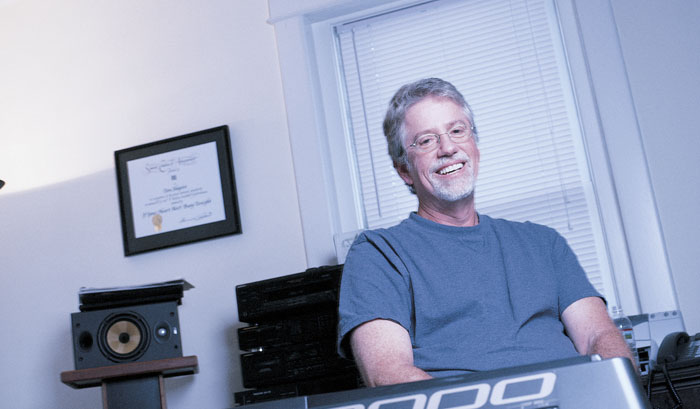


Tom Shapiro is one of the unchallenged masters of contemporary country songwriting. Twenty-one of his songs have hit #1, and he is the only writer in Music Row history to be named BMI's Country Songwriter of the Year three times within five years (in 1993, '96, and '97). He's also a successful producer whose credits include Billy Dean's string of hits, many of which he also co-wrote.
Ironically, Shapiro wasn't exactly born and raised a country boy. The Kansas City native went to college in Boston before breaking into songwriting in LA's R&B market. But he made tracks for Music Row after his first big break in the '70s: George Benson's hit recording of Shapiro's "Never Give Up on a Good Thing."
I feel very strongly that most demos should be extremely polished. They should sound like records.
"I love Nashville," says Shapiro. "I love the writing community. I learned my craft here, especially lyric writing. It's a lot like Kansas City, only with vegetation."
We recently pried Shapiro away from his songwriting schedule long enough to share some insights about his craft.
You majored in both music and English in college. Does anything you learned in literature class help you as a songwriter today?
"I'm not sure. I don't know what my class on, say, the Theater of the Weimar Republic gave me, but you never know what sorts of things get imbedded in you. I know I'm not a very poetic writer. I tend not to use language like 'The Cinnamon Sky.' I rely more on conversations and character. I'm also not very detail-oriented in my use of images. You know that Alan Jackson song, 'Drive,' with all the details about motors? Well, I never even think of stuff like that.
What themes do captivate you?
"For a while, I was always writing about the angry girl who got back at the boyfriend who dumped her. I had 'Watch Me,' which Lorrie Morgan cut and 'Better Things To Do' and 'You're Easy on the Eyes' with Terri Clark. But I don't do that style much now. I just try to respond to good ideas."
Was it difficult to adjust to Nashville songwriting, with its emphasis on co-writing?
"I love collaboration. It's fun, and you learn a lot. I used to write mainly by myself in LA. I always used to torture myself by loving something one day and hating it the next. So it's nice to have someone in the room who can say, 'No, that's good!' Also, you have to remember that a lot of the time what makes a song is the initial seed, and that often emerges outside the collaborative moment. To cite an example a lot of people know, 'I Hope You Dance' was a collaboration, but it started with a strong idea that one of the writers brought to the writing session. In cases like that, it's just a matter of shaping and editing and bouncing ideas. And sometimes I'm lucky enough to be there."
Is there a difference between collaborating with songwriters and collaborating with artists?
"You hope the artist knows what they want. That's the number-one most important thing. It's so hard if they don't know what they want. There are a lot of artists who probably shouldn't be writing. And they're usually in a hurry to get it done and very busy at the same time. But if you get to write with an artist/writer, it's easy. Two examples jump to mind: Sara Evans and Terri Clark. They know what they want and have good ideas. They understand song structure, melody, and what a song has to do emotionally. They're songwriters."
Does a great song need a slick-sounding demo?
"There's that rare magnificent song that can get away with a simple demo - 'The Wind Beneath My Wings,' for example. And our demo for 'I Hope You Dance' was very simple. But I feel very strongly that most demos should be extremely polished. They should sound like records. You're competing with a lot of songs in this town, and yours has to jump off the tape. Sure, this town has a lot of artists and A&R people with great ears, people who could probably hear a great song through bad production. But they're often listening to song demos alongside the latest pop records and want the same sort of sizzle."
How often do you write with a specific artist in mind?
"I try not to do that too often, because if the artist passes on a song, you may be stuck. But if I know that someone like George Strait has an album coming up and I have an idea I think would be good for him, I'll definitely go that route."
You write on a Yamaha PSR9000.
"Yeah, I'm the poster boy for that machine. I'm not very tech-minded, so when I get inspired, I just want to do it. I want the speakers and all the sounds right there in the keyboard. Also, the PSR grooves can really inspire a song. I got my PSR at a time when my writing felt very stale, and those grooves really helped me. I wrote a string of hits on mine: Brooks & Dunn's 'Ain't Nothing 'Bout You.' Joe Diffie's 'In Another World.' Tracy Byrd's 'Just Let Me Be In Love' was inspired by a Latin groove on the PSR. My only problem is, I've written so many songs with those PSR grooves that I need some new ones."
Can you name the three songs you're proudest of?
"'I Miss My Friend,' which was recorded by Darryl Worley. 'No Place That Far,' which Sara Evans did. 'And If There Hadn't Been You,' which Billy Dean did. Those three just had an emotional thing to them. 'If There Hadn't Been You' was written for my wife, and it just has something that moves me."
























